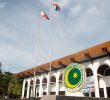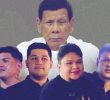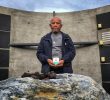Davao City — Davao del Norte Governor Rodolfo Del Rosario categorically denied he received 5 million pesos out of the controversial fertilizer fund that is being investigated by Congress.
In an interview with ABS-CBN Davao, Del Rosario said point-blank he never accepted cash allotments from the fertilizer fund. He revealed what he received in reality are in the form of materials or implements for use in the drip irrigation system project, which he proposed for funding to the Department of Agriculture (DA).
Del Rosario said he was surprised to learn that his name was included in the list, purportedly released by the Department of Budget and Management (DBM), showing the names of local officials who allegedly got money from the 728 million pesos fertilizer fund in 2004.
He reiterated his stance during an interview with the early morning radio program “Sug-angan sa Kabuntagon (Cooking in the Morning)”, aired over a local FM station in Tagum City.
“I was surprised with the report that I have received P5-million from the fertilizer fund when I did not get any cash allocation but materials for our drip irrigation project,” Del Rosario said in the vernacular.
Del Rosario said pursuant to the Ginituang Masaganang Ani (GMA) program of President Gloria Macapagal-Arroyo, the local government units were required to submit a project proposal worth 5 million pesos.
“In order to enhance food production, being the governor at that time, I submitted a program proposal to the DA for the development of our vegetable production in the province through the drip irrigation system technology,” the governor bared.
He said the beneficiary of the project included all the 223 barangays of Davao del Norte. A pilot vegetable garden which employs drip irrigation system was then established in every barangay for the farmers to see for themselves how the system works.
Del Rosario added he pursued the project in order to improve the income of the poor farmers. An experiment conducted at the capitol grounds demonstrated that a 400-square meter parcel of land that employs drip irrigation system and is planted with high-value vegetables will give a much bigger income compared to an hectare of rice land.
The governor confirmed the province enjoyed many allocations coming from the DA at the time intended for farm-to-market roads, rehabilitation of NIA irrigation systems, among others, pursuant to the food security program of the national government.
“But, the only thing we did not receive in the province is fertilizer because I did not ask for it,” Del Rosario concluded, reiterating that the drip irrigation system that he received was not in the form of cash but was delivered in kind for use of all the barangays of the province. (DNorte/PIA XI)










